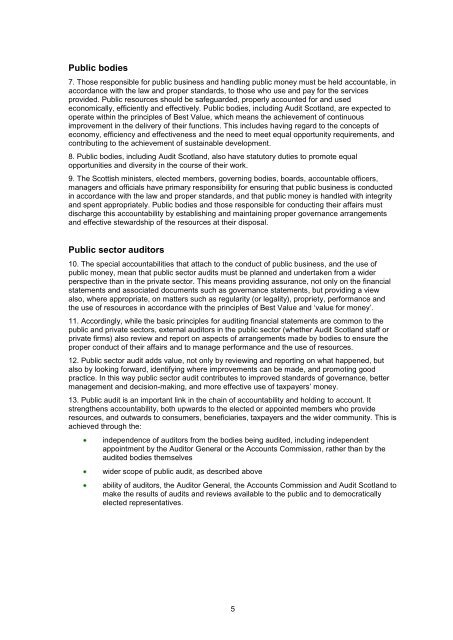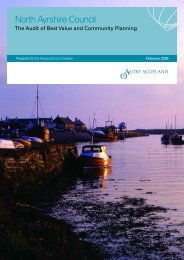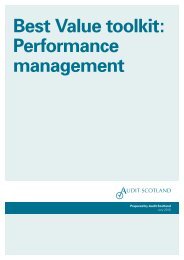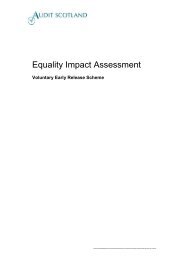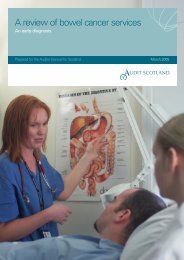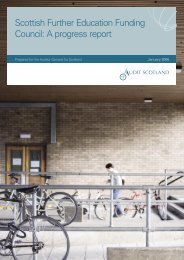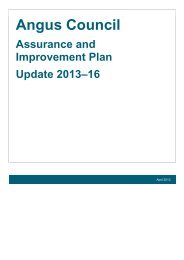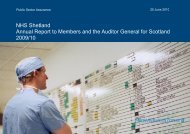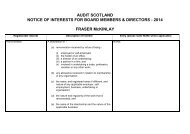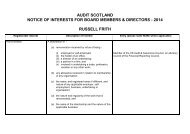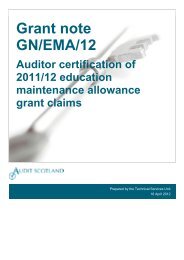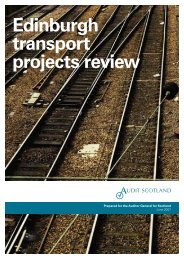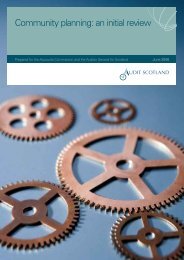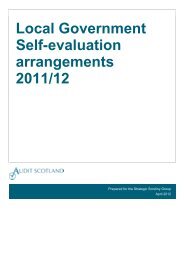17 March 2011 - Audit Scotland
17 March 2011 - Audit Scotland
17 March 2011 - Audit Scotland
Create successful ePaper yourself
Turn your PDF publications into a flip-book with our unique Google optimized e-Paper software.
Public bodies7. Those responsible for public business and handling public money must be held accountable, inaccordance with the law and proper standards, to those who use and pay for the servicesprovided. Public resources should be safeguarded, properly accounted for and usedeconomically, efficiently and effectively. Public bodies, including <strong>Audit</strong> <strong>Scotland</strong>, are expected tooperate within the principles of Best Value, which means the achievement of continuousimprovement in the delivery of their functions. This includes having regard to the concepts ofeconomy, efficiency and effectiveness and the need to meet equal opportunity requirements, andcontributing to the achievement of sustainable development.8. Public bodies, including <strong>Audit</strong> <strong>Scotland</strong>, also have statutory duties to promote equalopportunities and diversity in the course of their work.9. The Scottish ministers, elected members, governing bodies, boards, accountable officers,managers and officials have primary responsibility for ensuring that public business is conductedin accordance with the law and proper standards, and that public money is handled with integrityand spent appropriately. Public bodies and those responsible for conducting their affairs mustdischarge this accountability by establishing and maintaining proper governance arrangementsand effective stewardship of the resources at their disposal.Public sector auditors10. The special accountabilities that attach to the conduct of public business, and the use ofpublic money, mean that public sector audits must be planned and undertaken from a widerperspective than in the private sector. This means providing assurance, not only on the financialstatements and associated documents such as governance statements, but providing a viewalso, where appropriate, on matters such as regularity (or legality), propriety, performance andthe use of resources in accordance with the principles of Best Value and ‘value for money’.11. Accordingly, while the basic principles for auditing financial statements are common to thepublic and private sectors, external auditors in the public sector (whether <strong>Audit</strong> <strong>Scotland</strong> staff orprivate firms) also review and report on aspects of arrangements made by bodies to ensure theproper conduct of their affairs and to manage performance and the use of resources.12. Public sector audit adds value, not only by reviewing and reporting on what happened, butalso by looking forward, identifying where improvements can be made, and promoting goodpractice. In this way public sector audit contributes to improved standards of governance, bettermanagement and decision-making, and more effective use of taxpayers’ money.13. Public audit is an important link in the chain of accountability and holding to account. Itstrengthens accountability, both upwards to the elected or appointed members who provideresources, and outwards to consumers, beneficiaries, taxpayers and the wider community. This isachieved through the:independence of auditors from the bodies being audited, including independentappointment by the <strong>Audit</strong>or General or the Accounts Commission, rather than by theaudited bodies themselveswider scope of public audit, as described aboveability of auditors, the <strong>Audit</strong>or General, the Accounts Commission and <strong>Audit</strong> <strong>Scotland</strong> tomake the results of audits and reviews available to the public and to democraticallyelected representatives.5


